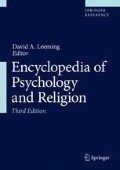Introduction
Medical professionals and psychiatrists often treat patients with personality disorders who have religious and spiritual disorders. Three personality disorders which are associated with religion are antisocial personality disorder (sociopath/psychopath), narcissistic personality disorder, and obsessive-compulsive personality disorder. In Future of an Illusion, Freud argued that religious beliefs were rooted in illusion and fantasy, and therefore, they might result in psychosis. He claimed that religions brought with them the universal obsessional neurosis of humanity. This negative view regarding religion, however, was not an outcome of scientific and systematic research based on sound objective observation, yet it continued into modern times in the works of psychiatrists and psychologists, such as Wendell Watters and Albert Ellis, who have pointed out the irrational nature of many religious beliefs. Before DSM-IV, various diagnostic manuals have described staunch religious followers as psychotic cases.
There are evidences that population with higher incomes and education tend to believe less in the existence of gods. Furthermore, many researches suggest that people become more religious when they are unfit physically or mentally. Also, there are instances when religion is used to assist people in distressing circumstances or in high psychological stress situations. Fasting, praying, and crying out to gods are some of the religious rituals performed regularly across religions in order to seek comfort. Post-9/11 terrorists’ attacks, many people turned to religion when they became convinced that there was no hope for humanity and when their lives were in danger. Nevertheless in the last three decades, gradually the researchers have started paying more attention to the objective study of religion and its relationship to metal health and illness.
Antisocial Personality Disorder
Also known as sociopath, or psychopath, the ASPD is the most treacherous, dangerous, and difficult one to find out among the bunch of other personality disorders. The chameleon-like nature of the patients makes it difficult for the practitioners to identity them. The patient suffering from ASPD makes commitments, but they do not have any intention of carrying them out; quite surprisingly, they do exactly the opposite of them. Generally, religions teach us to be tolerant and respectful to others; on the contrary, the religious people suffering from ASPD harm, kill, and destroy each other in the name of religion.
For example, on December 6, 1992, as many as 150,000 Hindu fanatics who were instigated by the leaders of Vishva Hindu Parishad (VHP) and Bharatiya Janata Party (BJP) participated in the demolition of the Babri Mosque in India causing Hindu-Muslim riots and the death of 2,000 people. Similarly, on February 27, 2002, a mob of 2,000 Muslims set fire the four coaches of the Sabarmati Train, killing 59 Hindus in Godhra (India). The jihadis and the ISIS terrorists, led by a fundamentalist, Wahhabi doctrine of Sunni Islam, posed a danger to the entire humanity. The ASPD patients are mostly revengeful and violent, and they want to destroy their targets completely.
Narcissistic Personality Disorder
A person suffering from the NPD loves to be the focus of attention, and religious environments generally provide them a great chance to fulfill this desire. The patient starts feeling superior whether or not he/she deserves it and begins calling him−/herself god or goddess. In India, a popular case is of Radhe Maa (real name Sukhvinder Kaur) who started to show herself as decorated goddess Durga. In 2015, an activist lawyer lodged a police complaint against Radhe Maa for obscenity, fraud, and cheating when few of her personal videos went viral. The patients suffering from the NPD claim that they have a special relationship with the divine. In 2014, self-proclaimed god man saint Rampal and his followers took law into their hands in India. Another self-styled god man Asaram Bapu was accused of sexually abusing a 16-year-old girl in India. Similarly, Swami Nithyananda landed in a controversy when a video footage went viral showing him in a compromising position. Generally, the NPD patients discount, degrade, and dismiss those people who are not entirely loyal to them. It is easy to find out the NPDs as they are deeply insecure and they strive hard to protect their crafted images.
Obsessive-Compulsive Personality Disorder
Also known as obsessive-compulsive disorder, the OCPDs generally use exceptional logical reasoning and the power of their mind to figure out who is god. Often, they create their own version of personal god. The patients suffering from this disorder are very particular about rules and routines, and they follow them meticulously. Therefore, the people suffering from the OCPDs consider their religion correct and their gods and goddesses most powerful, and if someone does not follow their religion and does not worship their gods, they feel offended and consider such persons their enemy. For example, the jihadis and the ISIS militants want to convert the entire world into one Islamic state, and for that, they are killing millions of people worldwide. In Hinduism, cow is considered sacred, and worshipped by many, but this does not permit the killings of beef eaters and incidents of cow protection-related lynchings.
Bibliography
Ellis, A., & Harper, R. A. (1989). A new guide to rational living. North Hollywood: Wilshire Book.
Freud, S., & Dufresne, T. (2012). The future of an illusion. London: Broadview Press.
Watters, W. W. (1992). Deadly doctrine: Health, illness, and Christian god-talk. Buffalo: Prometheus Books.
Author information
Authors and Affiliations
Corresponding author
Editor information
Editors and Affiliations
Rights and permissions
Copyright information
© 2020 Springer Nature Switzerland AG
About this entry
Cite this entry
Dwivedi, A.V. (2020). Personality Disorders. In: Leeming, D.A. (eds) Encyclopedia of Psychology and Religion. Springer, Cham. https://doi.org/10.1007/978-3-030-24348-7_200093
Download citation
DOI: https://doi.org/10.1007/978-3-030-24348-7_200093
Published:
Publisher Name: Springer, Cham
Print ISBN: 978-3-030-24347-0
Online ISBN: 978-3-030-24348-7
eBook Packages: Behavioral Science and PsychologyReference Module Humanities and Social SciencesReference Module Business, Economics and Social Sciences

